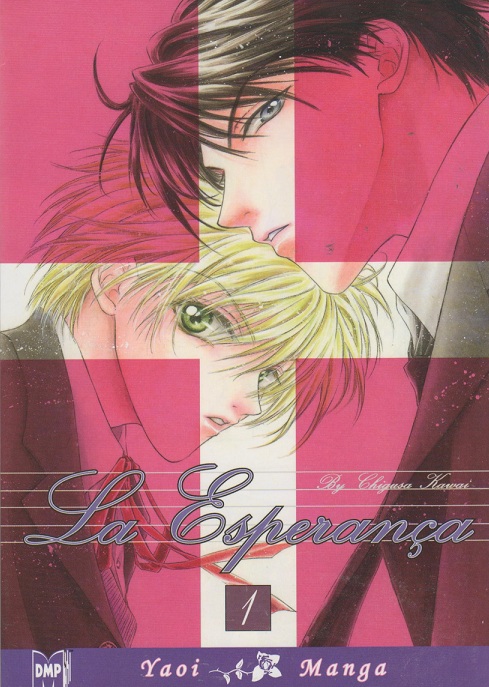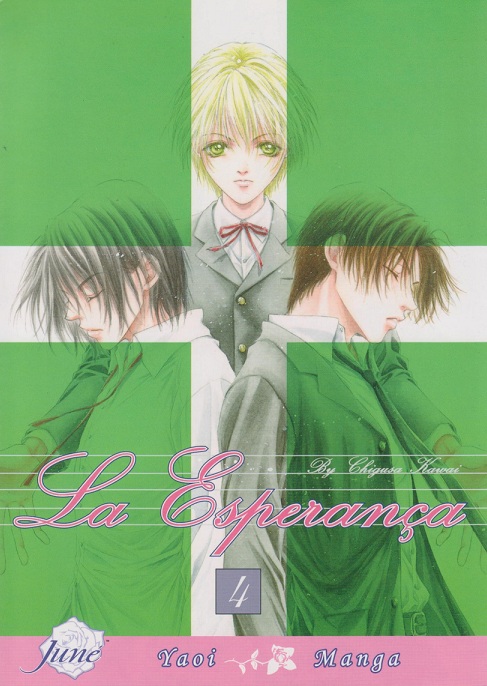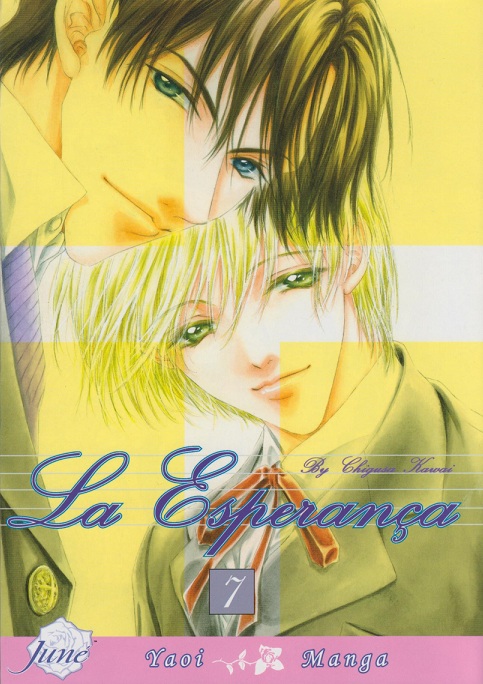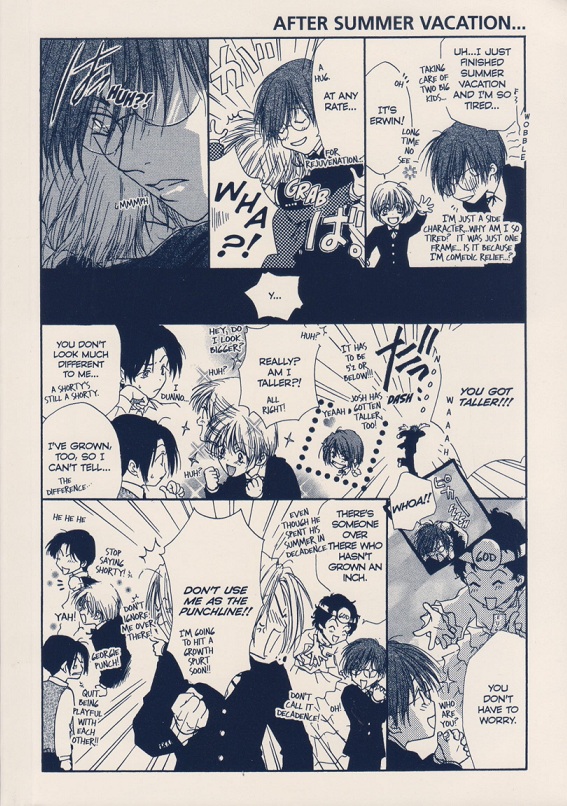 Title: La Esperanca
Title: La Esperanca
Author: Chigusa Kawai
Publisher: Digital Manga Publishing (moves to the Juné imprint with volume 3)
Volume: Volumes 1-7 (full run), $12.95 each
Vintage: 2000-2006 by Shinshokan in Japan, 2005-2007 by Digital Manga
Genre: Yaoi, romance, drama; it’s rated 13+, and it’s pretty clean (just the rare kiss and I think a single attempted rape scene that doesn’t get very far), so it’s certainly safe for teens to read
At Saint Grollo Boys’ School (at their four-year high school), Georges Saphir lives a simple life. Striving to be pure of heart and fair to everyone, Georges has become a legend at the school, an angel who is friendly to all and strong in his faith in God. He would rather disappear than hurt another person, but his desire to be equal with everyone creates a line between him and others and keeps him at a distance; he is afraid to single people out, but also afraid to get close to others. The only way he can like himself is to be equally kind to everyone, but this sort of kindness is not always exactly kind. Enter Robert Jade, a delinquent who has lost his faith in God, and who hates people like Georges, believing that kind of person can’t really exist, that there is a lie in their existence. He takes it upon himself to destroy Georges, to uncover the young boy’s true self, and to challenge Georges’s faith and stance on life.
Of course, being the well developed characters that they are, there is much more to both Georges and Robert than what they present to others. Georges’s father worked for a loan company that would often charge large interest rates and caused many people to lose everything. For this Georges hates his (now dead) father, and has vowed never to hurt another person again. But being the perfect student, perfect friend, and perfect son to an ailing mother isn’t always easy, and when Robert starts questioning his purpose, it isn’t easy for Georges to keep up his facade. For his part, though Robert initially seems quite menacing and cruel, he is actually quite kind. While at first it seems he only wants to crush Georges’s innocence and shatter his faith, eventually he begins to try and protect Georges and help him grow as a person.
 There is wonderful contrast between Georges and Robert. Their physical appearances set them apart immediately. Georges is well dressed, well mannered, well groomed, small and frail looking, blonde, and angelic. Robert, while not exactly sloppy, is far from impeccable, tall, dark haired, and a little cold and even sinister looking on occasion. When Georges’s perfect image breaks, whether with anger, embarrassment, or grief, an entirely different person emerges. With Robert’s delinquent persona, it is when his affected coolness is shattered that he loses it, and he can lash out violently (like during a scene where he snaps and goes in the chapel, and destroys a statue of God). What’s important to note, and what drives Robert throughout the series, is that one of his strong attachments to Georges is his appearance, which reminds Robert of a girl he once loved, named Grace. Grace was a half-sister to Robert’s childhood friend, Alain, and both boys were in love with her. Like Georges, Grace was delicate and blonde, and had strong faith in God. Innocent, pure, and caring, she had lived a difficult life with an abusive father, and was transferred to an orphanage, where she was frequently visited by Robert and Alain. When they were older, Robert and Grace got into an argument, and Grace ran out into the street where she was struck by a car. Because God did not save such a devoted person, Robert lost his faith, and also blamed himself for Grace’s death (Alain blamed him as well). Robert is not only drawn to Georges’s physical resemblance to Grace, but also for his similar devoutness and innocence. Because all of Grace’s faith didn’t save her in the end, he is irritated by others who place so much reliance on God. Both boys are tortured by their pasts, but as they try to save each other, things only get more complicated.
There is wonderful contrast between Georges and Robert. Their physical appearances set them apart immediately. Georges is well dressed, well mannered, well groomed, small and frail looking, blonde, and angelic. Robert, while not exactly sloppy, is far from impeccable, tall, dark haired, and a little cold and even sinister looking on occasion. When Georges’s perfect image breaks, whether with anger, embarrassment, or grief, an entirely different person emerges. With Robert’s delinquent persona, it is when his affected coolness is shattered that he loses it, and he can lash out violently (like during a scene where he snaps and goes in the chapel, and destroys a statue of God). What’s important to note, and what drives Robert throughout the series, is that one of his strong attachments to Georges is his appearance, which reminds Robert of a girl he once loved, named Grace. Grace was a half-sister to Robert’s childhood friend, Alain, and both boys were in love with her. Like Georges, Grace was delicate and blonde, and had strong faith in God. Innocent, pure, and caring, she had lived a difficult life with an abusive father, and was transferred to an orphanage, where she was frequently visited by Robert and Alain. When they were older, Robert and Grace got into an argument, and Grace ran out into the street where she was struck by a car. Because God did not save such a devoted person, Robert lost his faith, and also blamed himself for Grace’s death (Alain blamed him as well). Robert is not only drawn to Georges’s physical resemblance to Grace, but also for his similar devoutness and innocence. Because all of Grace’s faith didn’t save her in the end, he is irritated by others who place so much reliance on God. Both boys are tortured by their pasts, but as they try to save each other, things only get more complicated.
 As Robert begins to feel more for Georges, he must separate his feelings for the boy from his feelings for Grace. As Georges sadly reminds him, he is not Grace, but is only himself. Georges, who has never placed one person above another, suddenly finds himself growing closer to Robert, and his barriers slowly fall throughout the series. However, he is concerned about the feelings of love and jealousy he feels toward a male, and becomes greatly troubled. It takes some time for him to sort out his true emotions and accept them for what they are. Later on, when he learns the truth about everyone’s pasts, he must deal with fighting out from under Grace’s shadow, and his own guilt over living a peaceful existence while others have suffered. Georges’s faith plays a large part in his character, but really plays a small part in the series on the whole. It’s who he is, it attracts Robert, and it’s a complication in their relationship. But really, it only affects Georges alone, and his struggles are not quite as deep as they probably should be. For Robert, his loss of faith is a large part of who he is, and his religious cynicism is often in conflict with Georges’s purity. These concepts of faith are not overdone, which is nice, but I do think the element is a little underused.
As Robert begins to feel more for Georges, he must separate his feelings for the boy from his feelings for Grace. As Georges sadly reminds him, he is not Grace, but is only himself. Georges, who has never placed one person above another, suddenly finds himself growing closer to Robert, and his barriers slowly fall throughout the series. However, he is concerned about the feelings of love and jealousy he feels toward a male, and becomes greatly troubled. It takes some time for him to sort out his true emotions and accept them for what they are. Later on, when he learns the truth about everyone’s pasts, he must deal with fighting out from under Grace’s shadow, and his own guilt over living a peaceful existence while others have suffered. Georges’s faith plays a large part in his character, but really plays a small part in the series on the whole. It’s who he is, it attracts Robert, and it’s a complication in their relationship. But really, it only affects Georges alone, and his struggles are not quite as deep as they probably should be. For Robert, his loss of faith is a large part of who he is, and his religious cynicism is often in conflict with Georges’s purity. These concepts of faith are not overdone, which is nice, but I do think the element is a little underused.
It’s not all about Georges and Robert, though they are certainly at the center of the story. Alain plays a large role as a catalyst between the boys, and as a reminder of Robert’s guilt. Henri, a long time friend of Georges, tries to force the boys apart, worried about the negative effects Robert may have on Georges. Freddy, the son of the local Duke, serves nicely as comic relief, but also causes some trouble that forces Robert to take extra actions in Georges’s life (during times when he is trying to forget about the boy). There are some other minor characters, who get highlighted in side chapters, or featured here and there, but even they change and grow despite their less frequent appearances. This series is all about the story.

I really rather enjoyed this series. It does have its flaws; there are some pacing issues, and the plot gets a little too confusing now and then. Overall it’s a pleasant read. Since there are seven volumes, there is bountiful time for character development, which is missing from a lot of yaoi titles. The sexual stuff (present in any yaoi book) is spread out very well, and doesn’t feel at all tacked on or superfluous. There’s even the occasional female in this story, and at least two serious male/female relationships (plus one in the past). It’s a great introductory series for someone interested in the yaoi genre, and is a really nice story about young, innocent love, overcoming one’s past, and accepting one’s true self. Kawai’s art is mostly strong, but occasionally a strange angle or expression is present. In profile, many of the characters have enormous, long chins, which look a little silly. Some expressions will pinch a character’s face in a strange manner. On the positive side, Georges looks appropriately angelic, and Robert’s darker appearance is a fantastic contrast. The translation is well done, though there is an occasional awkward line of dialog. Each volume has a small section in the back where Kawai talks about the chapters in that volume and highlights the main characters. While every volume has Digital Manga’s fairly standard dust jacket, the covers of each volume are covered in “photographs” on the front (related to the specific volume), and a bonus comic on the back cover (also related to something that occurred in that volume’s story).
Kris
kristin@comicattack.net
@girlg33k_kris
Review copies provided by Digital Manga.


Wow, very in-depth. Sounds like a good read that would make a great conversation piece.
Pingback: Kids’ manga, creator profiles, and the week in review | Anime Blog Online
This was a good and honest review on the series. I just read the whole thing again, and I agree with this whole-heartedly. This series does focus on character development the most, making it a good plus. I also agree with the flaws you mentioned in the review.
Ah, thank you for your comments! It really is a good read. I’ve been feeling like reading it again lately, too. That amount of character development is often missing in most yaoi; it’s difficult to really develop characters in just a couple chapters, or a single volume. There aren’t many creators who can pull it off well enough to stand out. Though part of that is due to the genre’s focus on sexual relationships, which often results in a rush to get to the steamy parts.
Pingback: Kids’ manga, creator profiles, and the week in review « MangaBlog